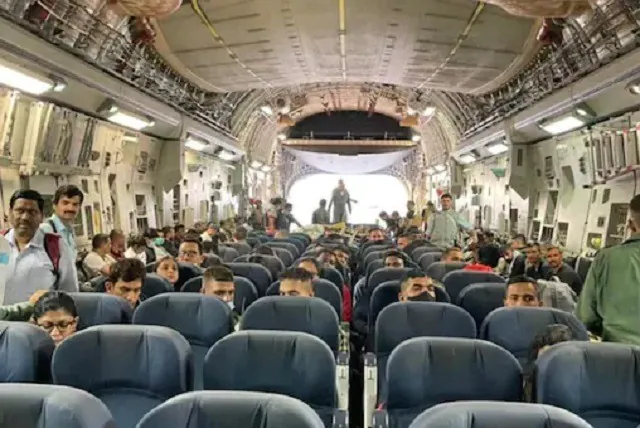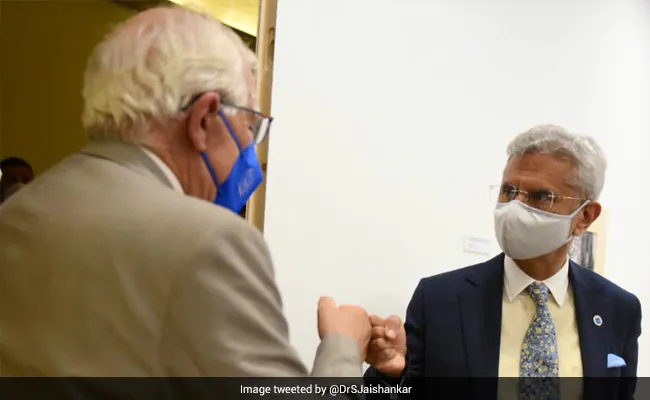The Union home ministry has launched an ‘e-Emergency X-Misc Visa’ to fast-track applications of people who are fleeing Afghanistan after the Taliban takeover
An air force rescue plane carrying Indian officials from Kabul, including its ambassador to Afghanistan and his staff, landed in Gujarat’s Jamnagar on Tuesday, news agencies reported, as the government took a series of steps, including emergency visas for people of all religions, to help its citizens and vulnerable Afghans trapped in the strife-torn country where Taliban insurgents have seized power in the wake of withdrawal of US troops.
Two heavy-duty C-17s of India have flown to Kabul using the Iranian airspace since the Taliban captured city of five million on Sunday. The first plane landed in India with 46 people on Monday, ANI reported. The second flight returned minutes before Tuesday noon with over 100 people on board.
“In view of the prevailing circumstances, it has been decided that our Ambassador in Kabul and his Indian staff will move to India immediately,” external affairs ministry spokesperson Arindam Bagchi tweeted on Tuesday morning.
ANI posted a video of relieved evacuees chanting “Bharat Mata Ki Jai” after the touchdown.
#WATCH | Evacuated Indians from Kabul, Afghanistan chant ‘Bharat Mata Ki Jai’ after landing in Jamnagar, Gujarat. pic.twitter.com/IqvESz79IO
— ANI (@ANI) August 17, 2021
The evacuation was fraught with challenges after the Taliban takeover. As desperate Afghans tried to flee Kabul, roads were choked at several points on Monday, even as unprecedented scenes unfolded at the airport. Desperate crowds huddled on to the wings of an evacuation plane and two people clinging to the exteriors of a flight fell to their death. Seven people, including at least two shot by US forces, died in the mayhem at the airport and all flight operations came to a halt.
External affairs minister S Jaishankar said he discussed the developments in Afghanistan with US secretary of state Antony Blinken. Jaishankar said on Twitter he “underlined the urgency of restoring airport operations in Kabul” and appreciated “the American efforts underway in this regard”.
Separately, National Security Adviser (NSA) Ajit Doval spoke to his US counterpart, Jake Sullivan, on Monday evening, ANI reported. After their conversation, the Indian officials were taken inside the airport in Kabul, which is being managed by the US after Turkey backed out of its plan to do so in view of the fast-changing security situation.
Meanwhile, the Union home ministry said it reviewed visa provisions “in view of the current situation in Afghanistan” and launched an “e-Emergency X-Misc Visa” to fast-track applications.
Earlier, Afghans were not covered under the e-visa category and had to physically present themselves at the embassy, sources told CNN-News18. But given the situation in Kabul, where the embassy is shut, the decision to open e-visas for Afghans was taken, they added.
The sources said all Afghans can apply for such visas, which will be scrutinised in Delhi. They said eligible people will be granted visas for a six-month period initially and documents required for applications will be made public shortly.
Earlier, foreign minister Jaishankar said it was important “we have accurate information about Indians there” and announced a Special Afghanistan Cell that can be reached on +919717785379 and MEAHelpdeskindia@gmail.com. He said officials were in “constant touch with the Sikh and Hindu community leaders in Kabul”.
We are in constant touch with the Sikh and Hindu community leaders in Kabul. Their welfare will get our priority attention. @capt_amarinder @HardeepSPuri — Dr. S. Jaishankar (@DrSJaishankar) August 16, 2021
On Monday, the government said it will take all steps to ensure the safety and security of Indians in Afghanistan as well as India’s interests there.
Foreign ministry spokesperson Bagchi also said there were a number of Afghans who partnered with India in the promotion of mutual development.
Later, at a United Nations Security Council meeting, India said the current situation in Afghanistan was of great concern.
“We hope that the situation stabilises soon and the parties concerned address the humanitarian and security issues. We also hope that there is an inclusive dispensation which represents all sections of Afghan society. Voices of Afghan women, aspirations of Afghan children and the rights of minorities must be respected. A broader representation would help the arrangement gain more acceptability and legitimacy,” TS Tirumurti, India’s permanent representative to the UN, said.
“If there is a zero tolerance for terrorism in all its forms and manifestations and it is ensured that the territory of Afghanistan is not used by terrorist groups to threaten or attack any other country, then Afghanistan’s neighbours and the region would feel safer,” he added.
In a military blitzkrieg over the past two weeks, the Taliban has captured all major cities in Afghanistan, as government forces melted away. The Taliban has defeated, co-opted or sent Afghan security forces — suffering from mismanagement and corruption — fleeing from wide swathes of the country, even with some air support by the US.
Many Afghans fear a return to the Taliban’s oppressive rule. The group had previously governed Afghanistan under a harsh version of Islamic law in which women were forbidden to work or attend school, and could not leave their homes without a male relative accompanying them.
The Taliban, pushed to a corner after the US entered Afghanistan as part of its campaign against terrorism in 2001, have regrouped over the past few years and captured power in an offensive, the swiftness of which stunned the world.
The US, which once ended the Taliban reign (1996-2001) and singled out the group for harbouring al Qaeda terrorists following the 9/11 attacks, has doubled down its decision to withdraw from the country after two decades of war by 11 September. President Biden maintains that Afghan forces and government should be able to defend their country.




